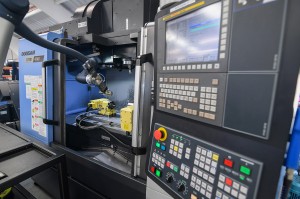Brexit is causing the South West’s small and medium-sized manufacturers ‘significant disruption’ as they try to recover from the economic effects of Covid-19, according to the results of a new survey.
The latest South West Manufacturing Barometer shows firms are being hit by more red tape, higher input prices and shortages of raw materials at a time when they are still struggling with the effects of the coronavirus pandemic. 
Produced by SWMAS, (the South West Manufacturing Advisory Service), the influential survey closely monitors the activity of small and medium-sized manufacturers around the region and is used to inform future government policy and support.
It had previously reflected firms’ concerns over the likely impact of Brexit – including just weeks ahead of the final EU/UK agreement being signed when more than half admitted they still not could predict how the UK’s transition out of the EU would affect their business.
At the time just 2% thought it would have a positive impact on their recovery
But with the UK now outside of the EU for nearly two months, the latest survey results reveal that 61% have already seen negative price changes within their supply chain, while the availability of raw materials is an issue for 52%.
Some 53% had encountered complications with importing goods and 43% were finding exporting their products more difficult.
Despite these problems, less than two fifths felt they were getting the right support and guidance from the government on how to navigate changes caused by Brexit – a fact SWMAS said underlined the need for better communication and additional tailored support. 
On a more positive note, 42% have increased sales in the past six months, with 50% expecting further growth between now and the summer – putting the region ahead of the UK average for the sector, which were 31% and 44% respectively.
However, just 15% expect sales to increase as a result of the Brexit deal, indicating that future growth will be based on their own actions and an improving Covid-19 situation.
SWMAS managing director Nick Golding, pictured, said: “South West manufacturers have had to deal with unprecedented levels of change over the past 12 months and it is encouraging to see they have the confidence to look forward positively based on the way they have adapted and changed throughout this difficult time.
“However, despite signs of an initial recovery, firms have a new set of issues to contend with now the Brexit deal is done.
“Price hikes in the supply chain have been immediate, and we are hearing tales of lead times being extended on raw materials.
“Over half of respondents aren’t convinced that the Brexit guidance they have already received from the government is adequate.”
He said the regions smaller manufacturers were also seeking clarity on key issues linked to Brexit, such as product markings and CE replacement (54%), sourcing components/services overseas and logistics or freight forwarding (both 49%).
“Reshoring has been spoken about as a potential opportunity and there is some confidence from manufacturers that new purchasing trends might drive increased sales to the UK,” added Mr Golding. 
“We would love to see more made of this and perhaps even a co-ordinated campaign to promote the benefits of locating production back home.”
Away from Brexit struggles, the latest Barometer paints a more optimistic picture of industry in the South West bouncing back from Covid-19 than other parts of the UK.
All key performance data were up since the last report, including future sales, profits, employment prospects and investment.
More than 40% of firms were planning to take on staff with 43% planning to spend more on new machinery and capacity to remain competitive in a challenging environment.
Mr Golding said: “Encouragingly, this report indicates that some companies feel these actions could be sufficient to help them survive and thrive over the coming months.
“It is reassuring to see that confidence appears to be slowly improving despite ongoing challenges, with the number of businesses expecting growth in future sales gradually returning to pre-pandemic levels, albeit on substantially lower expectations.
“We hope that further support for the manufacturing sector will help avoid more disruption, safeguard job and maintain future investment ambitions as businesses are still being asked to invest in new safeguarding measures for Covid-19 and the costs of complying with new standards and regulations resulting from exiting the EU.”





























